The 4th session of the inter-Burundian dialogue under the auspices of the Tanzanian facilitator ended on Sunday 19 February. A session marked by an about-turn, calls especially to the Heads of State of the region for help. The fate of this process remains in their hands.
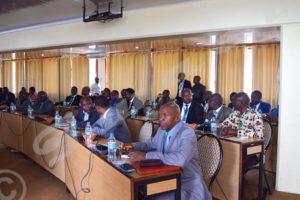
Some key participants in the fourth dialogue session
The message or SOS launched by Facilitator Benjamin Mkapa at the end of this stage of the talks reveals his discomfort or the stalemate of this dialogue full of jerks and a sudden turn of events.
“There is an imperative need to hold an Extraordinary Summit of the East African Community to expose the obstacles that drag the process,” he said after pointing out that this was his point of view.
“This is an urgency, I will present this to the mediator and the current President of the East African Community as soon as possible,” said the former Tanzanian President before a crowd of Burundian politicians invited to Arusha.
It was a part of this Burundian political class represented by Evariste Ndayishimiye, Secretary General of the ruling Cndd-Fdd party along with Edouard Nduwimana, the Ombudsman of the Republic at his side.
In the same row, there was the second Deputy President of the National Assembly, Agathon Rwasa and two former Heads of state further on. The place reserved for Senator Pierre Buyoya remained empty. He left the day before the session. Just behind these personalities, there was the duo Evariste Ngayimpenda and Tatien Sibomana of Uprona party not officially recognized by the Burundian Government.
The Uprona delegation recognized by the authorities was at the other end of the room, and right in front of them, Frodebu party Chairman, Frédéric Bamvuginyumvira, Cndd party President Léonard Nyangoma and Frodebu Nyakuri party President Kefa Nibizi, who brought down Jean Minani.
The latter, along with other leading lights from CNARED, the radical opposition platform, including Bernard Busokoza and Onésime Nduwimana, showed up for a while at the Arusha International Conference Center before returning to their hotel.
One analyst interviewed said the presence of these “men detested by Bujumbura” in the city would be the basis of the absence of a delegation of the Burundian government, yet invited in due form. It curiously retracted at the last minute.
Spectacular turn of events
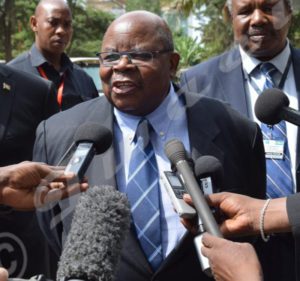
Mkapa: “There is a need for commitment to peace and respect for the Arusha Peace Agreement spirit.
It is at the last minute and to the surprise of everyone that CNARED announced its decision to meet Facilitator Mkapa, rejected by this coalition for months. “A little political game,” says an observer.
The facilitator tried, unconvincingly, to explain that the government was not invited saying that he only invited the leaders of political parties. As if reassuring, he announced in a short interview to the press that the delegation of the ruling party confirmed its participation in this round.
After the formation of groups such as that of the Ombudsman, the ruling party, the key actors and the political parties of the opposition, a document containing proposals was given out. Even CNARED received the draft.
At the end of the 4th session of the inter-Burundian dialogue, the groups made some suggestions on these proposals. Ten points were selected, but they were condensed into four main themes: The first two were the political and security issues followed by the electoral, legislative and constitutional issues as well as the socio-economic and humanitarian issues.
“On the basis of these proposals, I have the impression that there is a general agreement on the key issues to be discussed. There are differences in their implementation. However, I remain convinced that the 4 points form the basis of the next dialogue session, “said Facilitator Mkapa.
It was in the Arusha International Conference Center room, characterized by divergent positions of the Burundian political class that former Tanzanian President Mkapa said it was then necessary to commit to peace, that the principles and spirit of the Arusha Agreement must be respected.
The Special Adviser to the Secretary-General on Conflict Resolution, Jamal Benomar and an African Union delegate were present in the room. “They are stakeholders in this process,” he said.
But among the stumbling blocks, there is this categorical refusal of the delegation of the ruling party to sit down with the radical opposition. According to Evariste Ndayishimiye, Secretary General of Cndd-Fdd party, their place is before the court of justice and not at the negotiation table.
Invite all protagonists including coup plotters
The President of CNARED and his delegation were received twice by the facilitator Mkapa not at the Arusha International Conference Center but at a hotel. For Dr. Jean Minani, it is more than urgent to set up a transitional government. But above all, he insists,”we must invite all the protagonists in the Burundi crisis to the table of negotiations without forgetting all the groups that have risen up against President Nkurunziza”.
For Abel Gashatsi, President of Uprona party, if the Burundians are once again in Arusha, it is because they have problems to settle: “Minani and Busokoza have come. They are prosecuted and the mediator met them separately. It is a problem to be resolved so that the 2020 elections see the participation of all Burundians without any exception. It is necessary for everyone to participate so that peace can be restored. ”
According to Evariste Ngayimpenda of Uprona (not officially recognized by the Burundian Government), the facilitation has made significant progress even though much remains to be done. He, however, said the absence of the government delegation remains a stumbling block to this process.
No coming home unless there are promising signs
Frédéric Bamvuginyumvira, President of Sahwanya Frodebu party said the return of political exiles and refugees remained problematic given the political and security situation prevailing in Burundi.
For Domitien Ndayizeye, Former Head of State, it is not enough to call for return, only reassuring signs can convince people to return to their motherland.
“All governments have always claimed that security is guaranteed and called on refugees to return. President Micombero asked the refugees to return just after the bloody events of 1972, the same with President Bagaza. We spent more than 20 years in exile. Refugees cannot return unless there are positive signs.”
The signing of a peace agreement could take place in June after two rounds of talks according to the schedule set by Facilitator Benjamin Mkapa.
Evariste Ndayishimiye: “34 people cannot ruin the country”
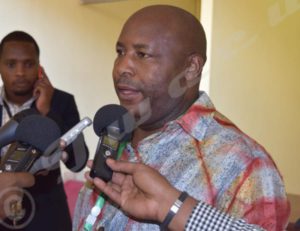 The Cndd-Fdd Secretary General is categorical: “I cannot sit with coup plotters. I cannot help them accomplish the coup, I am a democrat, power is gained through the polls,” he recalled on his arrival in Arusha.
The Cndd-Fdd Secretary General is categorical: “I cannot sit with coup plotters. I cannot help them accomplish the coup, I am a democrat, power is gained through the polls,” he recalled on his arrival in Arusha.
He didn’t change his mind even after the 4th round of inter-Burundian talks: “You cannot talk with wanted people. They have no political freedom. A criminal has no ideas to build the country, ”
When they are tried, he says, the government will appreciate what to do next. “It is not these 34 people wanted by justice that will ruin a whole nation. They tried to take power by arms but failed. It is necessary for them to join their Burundian fellows in the country. The salvation will not come from Arusha”, he said sarcastically before revealing that he would return to Bujumbura with some politicians from exile. A bet won.
Dr. Jean Minani: “We need a transitional government”
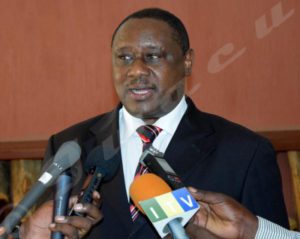 The president of the opposition platform engaged in the restoration of the rule of law (CNARED) said Bujumbura should not choose whom to hold talks or sit down with. Having come as the Head of a strong delegation of this opposition platform, Dr. Jean Minani proposes to define the real protagonists.
The president of the opposition platform engaged in the restoration of the rule of law (CNARED) said Bujumbura should not choose whom to hold talks or sit down with. Having come as the Head of a strong delegation of this opposition platform, Dr. Jean Minani proposes to define the real protagonists.
For him, these are people who support Nkurunziza on the one hand, and those who rose up to say no to the 3rd term or took up arms against Nkurunziza, on the other hand.
“We must not invent pretexts to dismiss Niyombare, generals, colonels… who plotted the coup. They must be there to explain the reasons behind their act, as well as President Nkurunziza, whom we consider to be a putschist. Peace cannot be restored unless all these people are associated”, says CNARED President.
Dr. Minani says leaders of civil society are not to be forgotten: “They have suffered this crisis which is still taking a heavy toll on them as a result of their commitment,” he said.
“We need a transitional government of two or three years to guide the Burundians, to clean up the ground so that Burundi can regain peace and serenity.
We need to rebuild our country to move towards unambiguous, democratic, free and transparent elections. ”
Pacifique Nininahazwe: “It is a pity that some insist on sharing political positions”
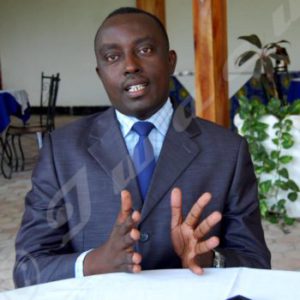 The human rights activist indicates that Facilitator Mkapa has failed in his analysis of the Burundian conflict.”How will he resolve this crisis when he, in fact, ignores actors? Why has he never met the “Halt to the third term movement”?
The human rights activist indicates that Facilitator Mkapa has failed in his analysis of the Burundian conflict.”How will he resolve this crisis when he, in fact, ignores actors? Why has he never met the “Halt to the third term movement”?
According to Pacifique Nininahazwe, “President Nkurunziza understands only the language of pressure: as long as he does not feel his power threatened, he will continue his game.”
For him, three tracks can force him into the dialogue.
The embargo on weapons and some economic aspects, the opening of ICC prosecutions and the repatriation of Burundian troops.
The activist is against any solution that will try to consecrate impunity. “It is a pity that some insist on the sharing of political positions before creating a framework that will no longer allow such crimes in Burundi.”
When passivity is no longer an acceptable option
At the end of this 3rd Dialogue Session in Arusha, a firm intervention by the EAC is needed to break the deadlock.
The crystallization of the jamming of the external process of inter-Burundian dialogue. Bujumbura sticks to its guns: It refuses to sit at the negotiation table with the actors it describes as coup plotters.
On Friday, 17 July, as a logical follow-up to its boycott, it went so far as to ask the Tanzanian government to stop “its hosts of the moment” who are prosecuted. The following day, when the meeting was in full swing in Arusha, the President of the National Assembly, Pascal Nyabenda, during the community development works in Bugarama zone of Muramvya central province, said the same as the executive: “No dialogue with coup plotters”
As if all this did not change its timetable, Bujumbura has already adopted, at a council of ministers of February 15, a draft decree on the creation of a commission in charge of proposing a draft amendment of the Constitution in between six and eight months.
Faced with these two pitfalls in the process of finding a way out of the crisis for Burundi, the facilitator Benjamin Mkapa can only solicit the firm intervention of those who mandated him: “There must be a summit to address barriers to the process.
To prevent the passivity of Heads of State against the intransigence of Bujumbura, the former Tanzanian President, strongly supported by the EU and the United States, could threaten to throw in the towel.
Will the leaders of this sub-regional organization remain passive in the face of this solicitation by the mediator? The Burundian crisis has regional repercussions.
The recent UNHCR statement calling on host governments to provide more room to accommodate Burundian refugees is a challenge.
“The majority of refugees are women, children and people with special needs,” UNHCR Spokesman William Spindler said on Tuesday (February 7th) at a press briefing in Geneva.
EAC credibility at stake
Several factors could cause the EAC to tighten its position. Tanzania is not going to accept the failure of Mkapa. It will press the sub-region to support it by forcing President Nkurunziza to be more flexible. The EAC has strengths, including the possibility of imposing an economic embargo for Bujumbura to return to better arrangements. The closure of the central corridor where the largest part of Burundian imports is passing would suffocate the country economically in the very short term. If this sub-regional group could not resolve the Burundi crisis, it would lose all credibility of the international community, which could then assume its responsibilities. The United Nations and the AU have new leaders who are uncertain as to their position on the Burundian crisis.
Moreover, they know that the alternative to a negotiated political solution is a new open civil war.
If the EAC is unable to contribute effectively to resolving the crisis in Burundi – one of the six member countries – the horizon of a political federation, a valuable idea to Ugandan President Yoweri Museveni, will be the view of the mind, another illustration of the trade of the mouth of evil policies of the sub-regional scale.

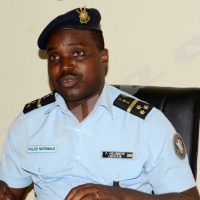
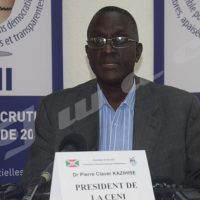
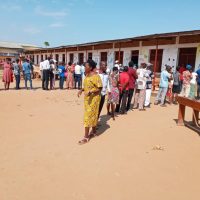
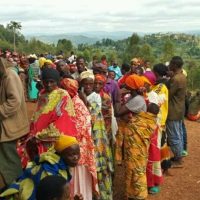
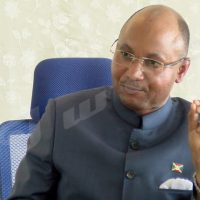













 IWACU Open Data
IWACU Open Data

